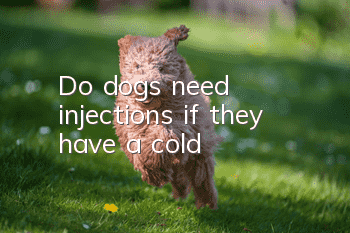Do dogs need injections if they have a cold?

Injections are not necessary for dogs with serious colds. There are many ways to administer medication, including oral administration, subcutaneous injection, intradermal injection, aerosol administration, and intravenous administration. The specific method of medication must be carried out under the guidance of a pet doctor. It is recommended that the owner take the dog to the pet hospital for medication. The owner is not allowed to use the medicine on his own initiative, otherwise it will be counterproductive. In addition to medication, daily care is also very important. Warming measures and daily nutrition also need to be done well.
Precautions for dogs with colds
1. Once the dog’s body temperature exceeds 40 degrees Celsius, antipyretic analgesics, such as Diazepam, are needed. Injections can be injected according to the size of the dog, and the dosage can be controlled at 0.5-2 ml/kg. It can also be treated with traditional Chinese medicine, such as Bupleurum injection.
2. If the dog has a watery nose, shakes its head, and keeps sneezing, it is recommended to inject about 0.5 ml (5 mg) of chlorpheniramine subcutaneously. For those with rough wheezing, vesicular sounds or severe coughing, 2 to 5 mg of dexamethasone can be injected intramuscularly. Generally, when this happens, it means that the dog's symptoms are serious, and it is recommended to send it to the doctor as soon as possible to avoid delaying the condition.
3. To combat concurrent infections with other diseases, penicillin is the first choice. 400,000-800,000 units intramuscularly, twice a day. Other antibacterial drugs such as kanamycin, cephalosporin, ciprofloxacin, ofloxacin, etc. can also be used. For dogs with severe symptoms, infusion should be arranged, using 10% glucose solution, penicillin, dexamethasone, and vitamin C for intravenous infusion.
4. For subcutaneous injections, it is recommended to go to a pet hospital and have a professional veterinarian perform the injection to avoid adverse reactions caused by your own mistakes.
- How to deworm a poodle?
- What should I do if my puppy keeps barking?
- How long can a Pomeranian live with kidney failure?
- How to practice dog movements and how many months does it take?
- How to care for pet dog hair in the hot summer, a must-read for poop collectors!
- Living habits of Chinese Shar Pei dogs
- How much dog food should a two-month-old puppy eat?
- Close contact with dogs, four tips for getting rid of dog bad breath!
- How to choose dog food for elderly dogs
- How many minutes does it take for a puppy to nurse?



